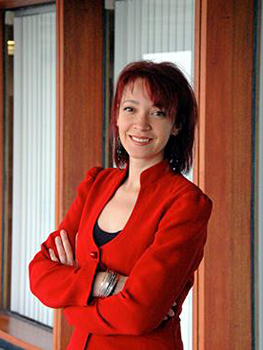Studying another language is a gateway to world citizenship, said Professor Maria João Dodman, Chair of the Department of Languages, Literatures & Linguistics at York University.

Language courses aren’t only about learning another language, Dodman said. Languages are embedded in specific cultures, enabling learners to engage and acquire global competencies that can include, for instance, important historical, ideological and literary references; students learn how to live appropriately within those languages.
“What we do is about character building, making sure that our next generation of leaders is engaged at a deeper level,” said Dodman. “We want students to acquire the skills of tolerance and open-mindedness, able to understand and value cultural difference while viewing the world through the eyes of another. In our differences, we see the plurality of cultural experiences and ourselves through the connectivity of the human condition.”
Antonella Valeo, an associate professor and undergraduate program director, said language courses help students decode other cultures.
“Often, students go abroad to study and are left to decode the culture,” Valeo said. “Language programs have this embedded in them; they are about the larger picture. For example, a Portuguese language student may not be in Portugal, but they are immersed in it through their intellectual and academic experiences.
“We want students to understand that internationalization means more than an exchange. Learning a language is a way to move away from the cruise ship version of internationalization.”
Dodman agreed, noting that it is possible to live internationally in Toronto, given the diversity of ethnic communities here. Faculty members that teach language have access to these local diasporas, where students can expand and practise their skills. Access to international film festivals and authors, events promoted by cultural institutions and community associations, for example, serve as a sort of international passport, enabling our students to build their global fluency.
“Learning another language with us is an immersive and authentic experience on and beyond campus, filled with various experiential opportunities,” Dodman said. “It gives you a respect for another culture and helps you to understand your own place in the world.”
Samia Tawwab, a sessional assistant professor and co-ordinator of the Italian Studies program, offers a perfect example of language experiential learning. With celebrations marking the 700th anniversary of the death of poet Dante Alighieri, author of the Divine Comedy, being held worldwide, the Italian Centro internazionale di studi Francesca da Rimini invited students of Italian language and literature across the globe to take part in the events. The students were to recite the verses spoken in the poem by Francesca da Rimini, one of its most notable characters. Tawwab participated in the event with six of her students, whose involvement took them beyond the understanding of the meaning of the lyrics to grasping the sociocultural, historical, literary and religious context of da Rimini’s story.
“Our students loved it,” said Tawwab. “We met on Zoom and rehearsed. They asked questions they would have never asked in class. They were very excited about being part of such an authentic experience. It was an amazing experiential learning opportunity for our students, and we were the only Canadian university taking part.”
Meanwhile, faculty members from the Japanese Studies program are also eager to offer students cultural opportunities and experiences.
“From day one, we focus on culture as well as language,” said Noriko Yabuki-Soh, an associate professor and co-ordinator of the Japanese and Korean Studies program. The program’s offerings include courses on anime and manga, as well as a course about Japanese foodways.
Prior to the pandemic, Japanese studies faculty joined with their Korean studies colleagues annually to host Japan-Korea Week, bringing speakers and participatory activities to campus for their students, events such as exhibitions by martial arts practitioners and tea ceremony masters demonstrating their art.
They also regularly enter students into the Ontario Japanese Speech Contest, an event supported by the Consulate General of Japan in Toronto and the Japan Foundation. Each Ontario university is allowed to enter a specific number of students based on the enrolment in their Japanese Studies program. Each student is required to give a speech in Japanese for judges and an audience.
“It’s extracurricular and requires lots of commitment, but it brings the students together,” Yabuki-Soh said. “We faculty members meet regularly with them to help them refine their speeches and get the pronunciation right. They also help each other regardless of level of expertise.”
This year, York student Peter Wenxiang Zhang, competing in the intermediate category, won the grand prize for best speech in the competition. He earned a round trip to Japan and spending money, but the pandemic has prevented the trip to date. In addition, York students swept the top three prizes in the beginner category and won prizes in the open and advanced categories, too. The first-place winners in each category automatically moved on to the National Japanese Speech Contest, where the three York entrants also took first-place prizes.
“We carefully select the participants based on their grades and proposed topics, as well as their willingness and ability to present,” said Yabuki-Soh. “It’s a fun experience for everyone.”
The department Chair says the value of the department’s many languages are particularly relevant now, as traveling has been discouraged. Taking languages at the department enables students to discover the world locally.
“What we do and the skills that students acquire cannot be measured,” added Dodman. “You can’t fit cultural competency into a neat box. It includes empathy for others and a generosity of spirit; these are intangible assets that learners acquire while studying another language.”
Originally published in yFile’s Innovation issue.
